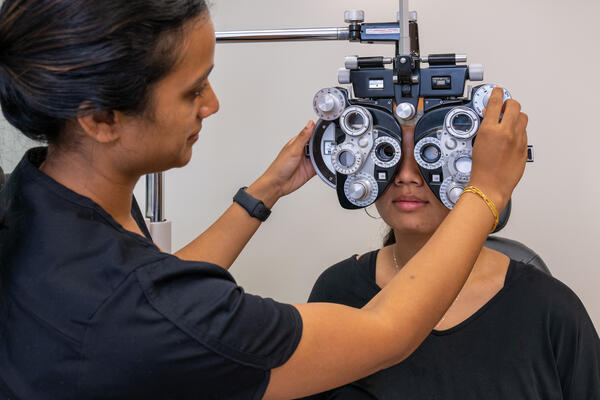Andalusia Optometrist: Dedicated Vision Look After Every Patient
Andalusia Optometrist: Dedicated Vision Look After Every Patient
Blog Article
Is Refractive Surgery Right for You? Variables to Think About for Better Eyecare
In the world of eye care, the choice to undertake refractive surgical procedure is a crucial one that requires thoughtful factor to consider. From the ins and outs of one's eye health to the details of daily practices and personal assumptions, each element holds significance in the more comprehensive landscape of refractive surgery candidacy.
Eye Wellness Assessment
When thinking about refractive surgical procedure, an extensive eye wellness examination is important to analyze the viability of the treatment for each and every person. andalusia pediatrics. This analysis involves a collection of exams and tests carried out by an eye care professional to determine the overall health of the eyes, the visibility of any kind of underlying problems, and the security of the refractive mistake
During the assessment, various variables are taken into consideration, such as the person's case history, current eye prescription, corneal density, student size, and tear movie high quality. These evaluations assist to recognize any type of contraindications to refractive surgical treatment, such as corneal problems, cataracts, or without treatment eye infections. Additionally, the examination helps to manage individual assumptions relating to the possible results of the surgery based upon their unique eye characteristics.
Eventually, the eye health analysis is important in ensuring the safety and efficiency of refractive surgical procedure, as it gives beneficial insights into the person's eye wellness status and assists identify the most appropriate therapy choices for accomplishing ideal visual outcomes. (eye doctors in andalusia)
Way Of Living Evaluation
A thorough lifestyle assessment is integral in identifying the viability of refractive surgery for a person's aesthetic adjustment demands. Way of life factors such as line of work, leisure activities, and day-to-day activities play a crucial role in the decision-making procedure concerning refractive surgical procedure.
In addition, lifestyle behaviors such as sports engagement, exterior tasks, or also skin care regimens can affect the healing procedure and overall success of refractive surgical treatment. By carrying out a thorough lifestyle evaluation, eye treatment specialists can customize their suggestions and treatment strategies to fulfill the distinct requirements of each person, inevitably leading to enhanced visual results and fulfillment.
Expectation Positioning

People need to understand that while lots of individuals accomplish 20/20 vision or far better complying with refractive surgical read this procedure, some may still call for glasses for particular tasks like analysis or driving at evening. Handling these assumptions assists protect against frustration and dissatisfaction post-surgery, leading to a more favorable general experience for the client.
Threat Analysis

Factors that might increase the danger of problems include age, specific clinical conditions like autoimmune conditions, unsteady vision prescription, slim corneas, and unrealistic person expectations. Additionally, selecting a skilled and proficient surgeon, following pre and post-operative treatment guidelines diligently, and revealing any appropriate case history can assist alleviate dangers.
To reduce the probability of issues, ophthalmologists perform extensive pre-operative examinations to determine any type of contraindications to surgical treatment. They also talk about the potential dangers and benefits with individuals during the consultation procedure. By engaging in open interaction and shared decision-making, both the individual and the eye doctor can interact to establish if refractive surgical treatment is the best choice based upon specific threat profiles and desired outcomes.
Examination Importance
Considering the vital duty of notified decision-making in examining dangers and prospective problems in refractive surgical treatment, the appointment process holds significant relevance in guiding patients towards optimum results. During the consultation, the ophthalmologist evaluates the patient's eye health and wellness, refractive errors, and general viability for surgery. This first analysis is essential in identifying the most suitable procedure for each and every person, taking into consideration variables such as corneal thickness, student size, and existing eye conditions.
Additionally, the assessment functions as an opportunity for clients to discuss their assumptions, issues, and any inquiries they might have pertaining to the surgical treatment. Clear interaction between the doctor and the patient is important to ensure practical expectations and a thorough understanding of i loved this the prospective threats and advantages entailed.
In addition, the examination enables the surgeon to describe the various surgical alternatives available, their respective results, and the post-operative care called for. This thorough discussion encourages clients to make knowledgeable decisions concerning their eye treatment, bring about much better complete satisfaction and outcomes post-surgery.
Final Thought
In conclusion, individuals thinking about refractive surgical treatment needs to undertake a detailed eye health and wellness examination, evaluate their way of living behaviors, straighten their expectations with potential end results, assess the involved threats, and prioritize examinations with eye care experts. These elements play an essential function in identifying the viability of refractive surgical procedure for each and every individual, making sure ideal outcomes and contentment with the procedure.
Patients thinking about refractive surgical procedure typically have high assumptions pertaining to the end results, expecting ideal vision without the requirement for glasses or call lenses. While refractive surgical treatment can greatly boost vision and decrease reliance on aesthetic aids, it is critical for people to comprehend that results might vary based on specific aspects such as the degree of refractive mistake, corneal thickness, and overall eye health.
By involving in open interaction and shared decision-making, both the eye doctor and the individual can work with each other to identify if refractive surgical treatment is the resource right selection based on individual risk profiles and preferred end results.
Taking into consideration the critical role of educated decision-making in analyzing dangers and possible issues in refractive surgery, the consultation procedure holds significant value in directing individuals in the direction of ideal end results. During the examination, the ophthalmologist examines the individual's eye health, refractive errors, and overall suitability for surgery.
Report this page